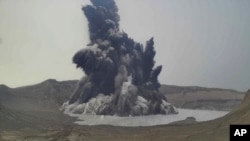A small volcano near the Philippine capital belched a dark plume of steam and ash into the sky in a brief explosion Thursday, prompting officials to start evacuating thousands of villagers from high-risk areas.
Government experts said magmatic materials came into contact with water in the main crater of Taal Volcano in Batangas province, setting off the steam-driven blast with no accompanying volcanic earthquake. They said it's unclear if the volcanic unrest could lead to a full-blown eruption.
"It's just one explosive event; it's too early to tell," Renato Solidum of the Philippine Institute of Volcanology and Seismology said at a news conference. Three smaller steam-driven emissions occurred Thursday night, he said.
The agency raised the alarm at 311-meter Taal, one of the world's smallest volcanoes, to the third of a five-step warning system, meaning "magma is near or at the surface, and activity could lead to hazardous eruption in weeks."
Alert level 5 means a life-threatening eruption that could endanger communities is occurring.
Mark Timbal, a spokesman for the government's disaster-response agency, said officials started to evacuate residents from five high-risk villages. Up to 14,000 residents may have to be moved temporarily away from the restive volcano, he said.
Officials reminded people to stay away from a small island in a scenic lake where Taal is located and is considered a permanent danger zone along with a number of nearby lakeside villages.
The ABS-CBN network broadcast videos of some residents with their belongings in cars and motorcycles forming a line at a gasoline station. Residents said they did not feel any tremors but reported a volcanic sulfur smell.
Batangas Gov. Hermilando Mandanas said evacuation camps, trucks, food packs and face masks were ready in case the volcanic unrest escalated and more people needed to be moved to safety. There were concerns that crowding in evacuation camps might spread the coronavirus in a region that has seen a spike in cases in recent months.
Taal erupted in January 2020, displacing hundreds of thousands of people and sending clouds of ash to Manila, about 65 kilometers to the north, where the main airport was temporarily shut down.
The Philippines lies along the Pacific "Ring of Fire," a region prone to earthquakes and volcanic eruptions. A long-dormant volcano, Mount Pinatubo, blew its top north of Manila in 1991 in one of the biggest volcanic eruptions of the 20th century, killing hundreds of people.




